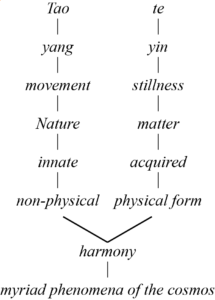第九章 新生論
In light of the discussion in Chapter Seven, we can give this brief description of the Tao: it is harmony, harmonizing force. That is the truth of connection, intermediaries, linking and bonding together with harmonizing. In ancient Chinese philosophy the original substance of the Tao was the Great Ultimate; in chemistry it is hydrogen and oxygen gases; in the theory of electricity it is the two polarities of electricity. At its origin the Great Ultimate is a mass of non-polar ch’i. Hydrogen and oxygen essence react to form water. Thus all phenomena and all objects come into being from water. What we call the Tao is something metaphysical, above form. Though it is metaphysical, it nevertheless has substantive being. It lies within man’s being, and it harmonizes and unites with Heaven and Earth. The movement and stillness of all matter is the intentionality of the Tao. This intentionality can be thought of as life force, or “harmony”. Any living object in isolation will certainly be incapable of growth. To be alive a thing must harmonize and join with its counterpart. Therefore the Tao embraces all phenomena, harmonize all things. This is the essence of the Tao.
是故道者,和也,和力也,即銜接媒介聯繫親和之真理也。道之本體,在中國古代哲學中有太極,在化學上有氫氧二氣,在電學上有所謂陰陽性電。太極之初,為一團無極之氣象,氫氧化合而成水素,故萬象萬物,莫不由水而成。所謂道者,乃形而上之物。然此形而上之物,固仍為實質的,且在人類本體之中,而與天地相和合。故一切物質之動靜,皆有道意。此道意即生機也,亦即「和」是也。凡一切獨生之物,絕不能生長,皆須和容對象,始成為生物。是故大道包羅萬象,和容一切,是為道之本體。
The Tao is what we use and see and do every day: we can say that sentient and non-sentient beings all possess the intention of the Tao. Speaking in traditional terms, the Tao is spirit-nature. In our church’s way of speaking, it is the harmonon. But a harmonon existing alone cannot fulfill its function. If there were only Tao and no physical form to the myriad things, the Tao would have nothing through which to operate. Thus the operations of the Tao proceed through te(德, virtue), and te is none other than e-tropons. Only given te will the Tao’s workings be possible. Te is what lets the Tao assume form and develop, to differentiate into movement and stasis. Thus the workings of Tao depend on harmony and sincerity–that is, the fitting union of e-tropons and harmonons.
道者,日常所用所見所行無一非道,可謂有情無情皆含道意。此道以舊說論之,即為性靈;以本教論,即為和子。然和子單獨生存,即不能發揮其功能;萬物有道而無形,道即無從而行。故道之行,由於「德」,德即「電子」。有「德」而後「道」方得行,使道可具形而發展,其動靜之分,皆由「德」而使然。故大道之行,在乎和誠,即和子與電子之適切配合也。
Nature and matter are inherently counterposed. The Tao is Nature and te is matter. The two are contraries, but not to be separated. Of all living things under Heaven, there are none that do not accommodate the Tao’s vital intent, and the constructivity of te. Life and death, movement and stillness: these are harmonization of Tao with te; neither side can be dispensed with. If either is dispensed with, then Tao without te will become an empty void, and te without the Tao will end in dissolution of being. Thus Tao together with te are what Confucians think of as benevolence and sincerity. (Benevolence is the Tao, and sincerity is te.) In science, they are truth and reality; in Buddhism, they are emptiness and form; in Christianity, they are love and sin; in Islam they are purity and truth. Perhaps we can fit these concepts into the following scheme:
自然物質根本相對,道者自然,德者物質,二者相對而不相離。天下一切生物莫不容和道之生意,德之機構。生死動靜,道德融和,不可相廢。相廢,則有道無德而成虛空,有德無道而歸寂滅。故此道德亦即為儒家之仁誠(仁為道,誠為德);科學之真理與現實;佛家之空與色;基督教之愛與罪;回教之清與真。試為定義如下:
And so the Tao of Heaven tends returning. The great Tao cycles, with benevolence engendering the myriad phenomena and sincerity ever arising. Between Nature and matter there are half-yang, half-yin forces that act to attune them; these are divine intermediaries. Divinity is that part of creation which is above matter and below Nature. That is, what is above bodily essence and below cosmic ch’i is divinity. Those who cultivate the Tao unite bodily essence and cosmic ch’i. They return from matter back to Nature; from the acquired they rejoin with the innate; from reality they accord with truth. They emanate bonding force and are answered by harmonizing force; thus they can become divine. Conversely, if sacred beings do not follow Heavenly principles, their worldly mind will arise. Their remnant yang e-tropons will give off heat and grow heavier, whereupon they will sink down into reality and become matter. That is why it is said “sacred and mundane are equal”.
是故天道好還,大道循環,仁生萬象,誠息不已。在此自然物質之間,有某種半陰半陽之力在求二者之配合者,即為神媒。神為物質之上,自然之下之造化。故在精之上炁之下者,即是神也。修道者,即係合精炁為一體,由物質而返自然,由後天而合先天,由現實而配真理,發親力而應和力,故能成神。反之,如神聖不從天理,即生凡心,陽電子渣末即化熱而加重,遂即下降,復為現實,而成物質矣,故曰:「聖凡平等。」
The basis for this equality lies in harmony. When sacred and mundane can be made equal, that is harmony. Moreover, since freed spirits are the fundamental locus of the sacred, becoming a freed spirit means attainment to the level of harmony. But a deity does not always belong to the non-physical realm. In the physical world it is a humanly-embodied deity; in the non-physical realm it is a deity in the sacred sense. If one can be a humanly-embodied deity in the physical realm, one can be in harmony with sacred beings in the non-physical realm. On this the equality of mundane and sacred is based. The sacred is the highest level for deities within a spiral system. To attain the sacred means transcending to the realm beyond one’s own. Beyond that is a further stage where one can attune and coexist with Nature. This is the highest ideal of equality between mundane and sacred. Thus, whatever has life force and gains equality with the sacredness of higher realms may be said to have “shared existence”. To attune with Nature may be called “creating life” (oneself having grasped creation). Hence come the following qualifications:
聖凡平等之基礎在於「和」,能凡聖平等即為「和」,而聖之基本地位為自由神,故成自由神即係達到和的水準。然神亦未必盡屬無形,在有形為「人神」,在無形為「聖神」;能在有形之界為人神,則與無形之聖亦得和諧,此聖凡平等之基也。聖為一個旋和系中神之最高境界,成聖即為超出本界而登上界,進為上聖,亦可與自然配合而共存,此聖凡平等之最高理想也。故凡有生機而與上界之聖平等者,謂之「共生」;與自然配合者,謂之「造生」(自己把握創造)。故凡能:
1. By seeking it through merit and faith, one gains equality with the sacred in one’s own realm.
2. By seeking it through spiritual cultivation, one finds equivalence with the sacred in the realm above.
3. By continuing to a further stage of sacredness and deepening one’s practice, one gains equality with Nature.
4. When a freed spirit cultivates in stages and establishes merit, it can advance by stages and gain equality with Nature.
一、以功德或信仰探求平等者,即與本界之聖平等。
二、以修持探求平等者,即與上界之聖平等。
三、由上聖繼續深造者,即與自然平等。
四、由自由神而逐級修持培功者,亦得逐級上昇,而與自然平等。
Equality of sacred and mundane is a general description for all of the above. Each is determined by cultivation, merit, striving, and self-creation. The realm of equality between sacred and mundane have eternal life (life in the larger sense); mediocre life is particularized or composite life. Whichever kind of life it is, it demands self-creation and striving on one’s own. Otherwise even composite life will not be easy to keep, much less gaining eternal life.
以上總稱皆為聖凡平等,觀其修持功績自奮自創而決定。故此聖凡平等境界之生為永生(或大生),平庸之生皆是末生或和生,不論其為何種之生均須自奮自創,否則不但永生不可得,即和生亦不易得也。
Eternal life is life lived positively for all mankind and the cosmos. Composite life is pessimistic, living for one’s own momentary significance. The former is inclusive and without bounds, giving blessings without end. The latter is as fleeting as an epiphyllum flower, like dew or lightning in its inconstancy of birth and death. It is painful and deserving of pity. Thus we counterpose to it the three main kinds of striving.
所謂「永生」,即係積極為全宇宙人類之生而生;「和生」即為悲觀的,求其自身剎那間之意味而生。前者博大無涯,幸福無疆;後者則曇花一現,如露如電,生死無常,可痛亦復可憐也。故又可以三大奮鬥之意而配合之:
1. Strive toward Heaven for equality with Nature.(that is, to harmonize with Nature)
2. Strive with Nature to be equal with higher sacred beings.(otherwise breaking through a spiral harmony system will be impossible)
3. Strive within oneself to be equal with sacred beings. (attaining eternal life)
一、向天奮鬥,為與大自然平等(即為大自然調和)。
二、向自然奮鬥,為與上聖平等(否則不能突破旋和系)。
三、向自己奮鬥,為與聖平等(達到永生)。
All those who have physical cultivation but lack merit that accords with Heavenly principle, though they may rise in level, must continue to foster merit in themselves. Those who merely accord with Heavenly principle but lack cultivation can only rise by self-creation through stages. So it is that neither physical nor Heavenly principles can be dispensed with. Since ancient times ther has been this saying: “Heaven and mankind are one.”
凡具有物理之修持而不合天理之功德者,即得上昇,尚須繼續培養功德;如僅合天理,而無修持者,則祇能逐級自創上昇。因而物理天理不可偏廢,「天人一體」,古有名言。


